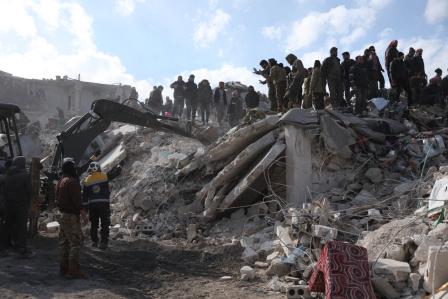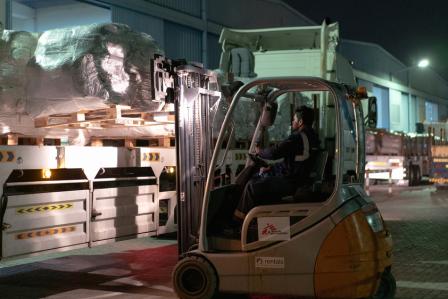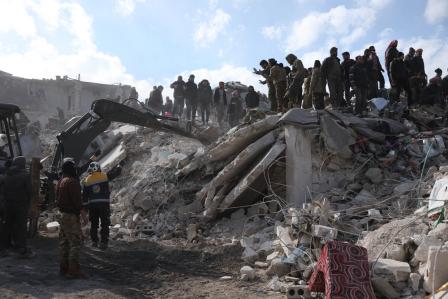Earthquake in Syria: "Hospitals were full of wounded and dead"
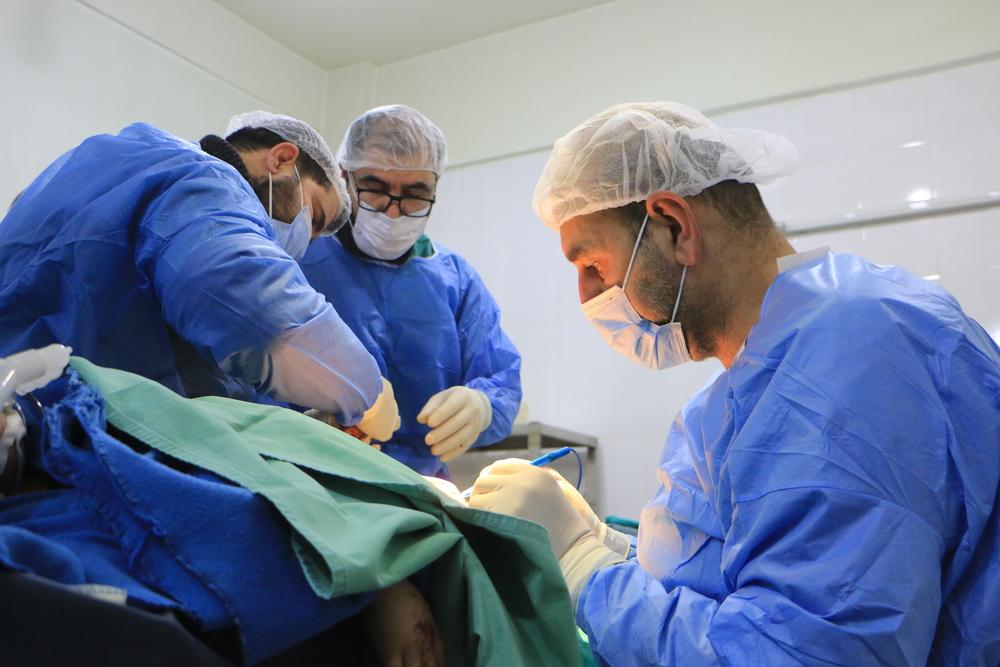
Syrian doctors operate on a patient in a hospital in Atmeh. The equipment for the operating room of this hospital comes from a donation from the Doctors Without Borders team in Atmeh. Syria, February 11, 2023. © Abdul Majeed Al Qareh
According to the latest estimates, the earthquakes that hit Türkiye and Syria have killed more than 35,000 people. In Northwest Syria, a largely landlocked region, Doctors Without Borders / Médecins Sans Frontières (MSF) teams present on the ground deployed an emergency plan as of February 6. The objective: to support hospitals and provide medical and material aid to populations, by mobilizing a large part of the 500 members of its staff active in the country. The Doctors Without Borders hospital in Atmeh, which usually specializes in caring for severe burns, has thus made numerous donations of medical and non-medical equipment and seconded its surgeons as reinforcements to several hospitals in the region. Additionally, numerous donations has been made from Doctors Without Borders local projects to 30 hospitals in the region.
“On February 6, we quickly understood that we were facing a catastrophic situation," explains Mohammad Darwish, deputy director of Doctors Without Borders Atmeh hospital. “The destruction was massive in the area, we launched our emergency plan less than 3 hours after the first earthquake and put our staff on alert.”
Atmeh teams have started to send medical equipment to around ten hospitals in the region, to Bab al-Hawa, Darat Izza, Idlib, and even to Atarib. “All the hospitals were overwhelmed, including ours,” explains Samih Kaddour, director of the Aqrabat hospital, specializing in orthopedic and reconstructive surgery.
“The Doctors Without Borders teams were the first to help us and to share their resources. They gave us materials, including making casts and sterilizing wounds. We received 800 people in the emergency room, 250 of whom needed surgical treatment. Even today [Saturday February 11], the wounded continue to flow in.” Since then unfortynately, the time window for emergency lives saving has closed.
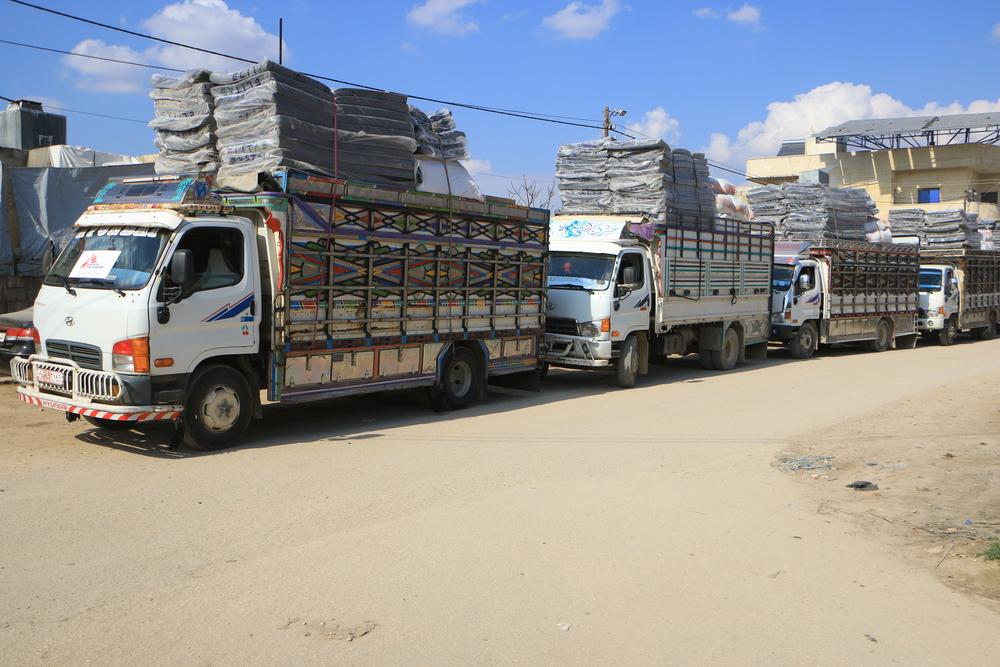
Trucks chartered by Doctors Without Borders teams from Atmeh hospital, on their way to a distribution. Syria, February 11, 2023. Syria. © Abdul Majeed Al Qareh
Doctors Without Borders surgeons from the hospital were also sent to certain health facilities in the region to help their colleagues who were dealing with a large number of injured. “I went to a hospital located in the immediate vicinity of Türkiye,” explains Dr Mohammad Zaitoun. “Due to the closure of the border, and the impossibility of receiving external support or transferring the wounded, this put immense pressure on us. There were many wounded, the medical staff was exhausted. We did our best together with the Doctors Without Borders teams in Atmeh. As a surgeon, I was in the operating room. We had never witnessed such an influx of wounded, except perhaps during the bombardments or massacres that took place in the region.”
Ambulances from the Atmeh hospital were also involved. They made it possible to transfer patients between hospitals. As for the Doctors Without Borders mobile clinics, their intervention plan was adapted to the situation and they were dispatched to places where the victims of the earthquake were flocking. The teams that make up these mobile clinics have been working on a regular basis for several years, providing health care to people living in the many camps in the region, which host war-displaced people. They are currently visiting the places where people who have lost their homes are taking refuge on a daily basis, whether in Sarmada, Kammouneh or Al Dana.
We still do not have a clear vision of the situation in the wider area of Atmeh. We just know that the hospitals are full of wounded and dead people and that the needs are immense. The people of the region need everything. We immediately opened our logistics warehouses and distributed hundreds of essential items, but it is not enough. 2,500 blankets have been donated to hospitals for their patients, and hundreds of kits of basic necessities have been distributed to families, among others.Mohammad Darwish, Hospital Dep. Director
In the immediate future, Doctors Without Borders teams in the region are drawing on their emergency stock, while waiting for an international supply, which have been hampered by the political tensions surrounding this landlocked region. Until the earthquakes, Bab al-Hawa was the only crossing point for humanitarian aid from Türkiye to this landlocked region of northwestern Syria.
“Almost a week after the earthquakes, we have not received any help from outside,” deplores Moheed Kaddour, director of a hospital in Atmeh, and brother of Samih Kaddour. “Support only came from other hospitals, local communities or organizations already present before the disaster. In this, the Doctors Without Borders hospital in Atmeh played an important role. However, this responsiveness, built through regular support for a network of around twenty health structures, is now facing certain limits, such as the impossibility of transferring patients who are in serious condition to Türkiye.”
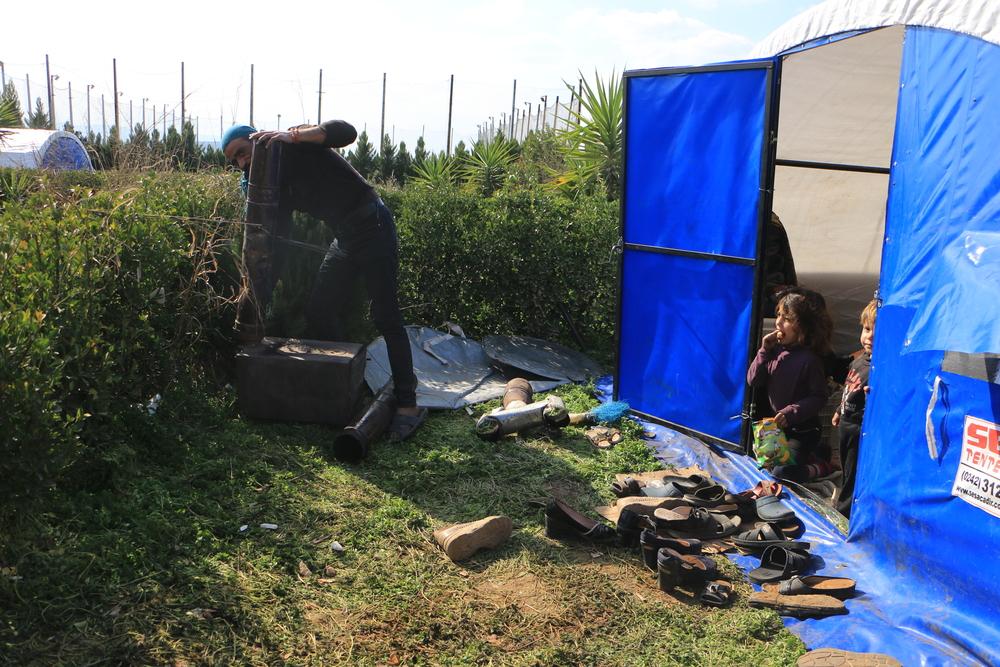
A resident of Atmeh who lost his house during the earthquake. The Doctors Without Borders teams donated tents to resident in the area to take shelter. Syria, February 11, 2023. © Abdul Majeed Al Qareh
“Usually we can transfer our most severely burned patients to appropriate health structures in Türkiye,” explains Mohammad Darwish. “The Doctors Without Borders hospital in Atmeh provides essential care, but also has its limitations and can only adequately care for people with moderate burns. Today, there are no more specialized hospital beds in the governorate of Idlib and one cannot cross the border.”
In northwestern Syria, these earthquakes are disrupting a region that already has more than 2 million displaced people living in camps and where access to health care is lacking. “Nine days after the earthquakes, we are still mobilized by the care of our patients, says Moheeb Kaddour. We are still performing life-saving surgeries on crush syndrome victims. This pathology, which results from a prolonged compression of the muscles, can be fatal by causing saturation and renal failure. The situation is indescribable and for now, we are alone.”
